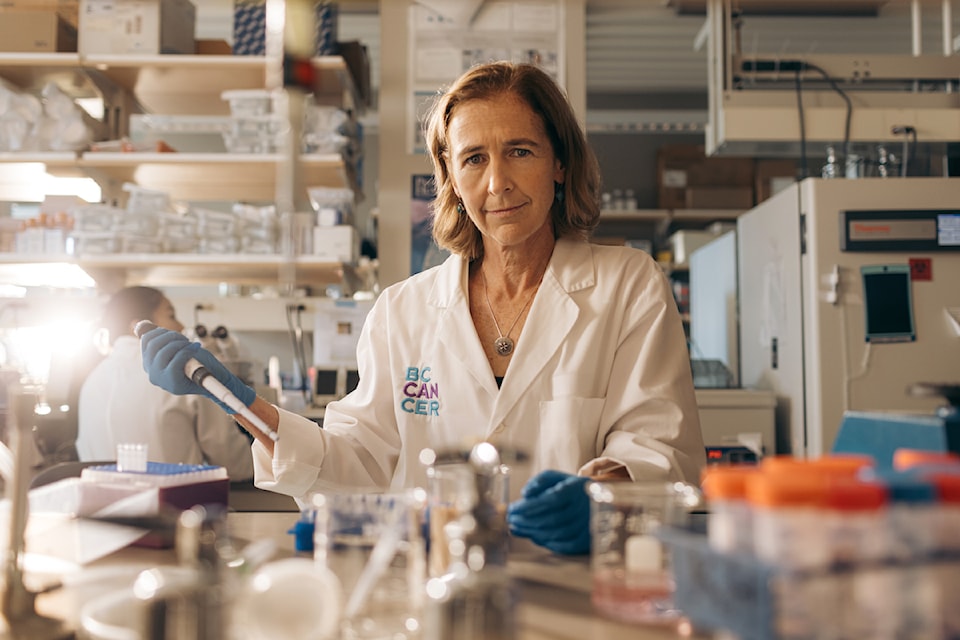Top Stories
AI Innovation Set to Revolutionize Women’s Cancer Care in Victoria

A groundbreaking artificial intelligence (AI) initiative from British Columbia is poised to enhance women’s cancer treatment in Victoria. Research led by Dr. Jessica McAlpine and Dr. Ali Bashashati at BC Cancer and the University of British Columbia (UBC) focuses on improving the diagnosis and treatment of endometrial cancer, which ranks as the sixth most prevalent cancer among women. This innovative approach aims to address the challenges posed by the ambiguous appearance of endometrial cancer cells, which often leads to inconsistent diagnoses.
The research team has developed a system that categorizes endometrial cancer into four distinct groups, each associated with different clinical outcomes. Despite this advancement, a subset of cases exhibited significant diversity, prompting the introduction of the AI ProMisE test. “We were able to look at these images of tumours and identify things that the pathologist couldn’t see and that the molecular tools couldn’t identify,” stated Dr. McAlpine. This technology enables doctors to better predict which patients may face poorer outcomes, allowing for more targeted treatment strategies.
Potential Impact on Treatment
The AI system not only aids in identifying patients at risk for severe outcomes but also has the potential to minimize unnecessary treatments. “Because of the tools we now have, some patients can avoid the toxicity of chemotherapy and radiation altogether,” Dr. McAlpine explained. This advancement could significantly reduce the burden on patients, sparing them from arduous trips outside their communities for treatment.
Plans are underway to implement these AI tools in medical centers such as those in Victoria within the next year, subject to securing philanthropic funding and necessary approvals. “We plan to pilot it in a couple of centres, and Victoria is potentially one of those,” Dr. McAlpine mentioned. The city’s strong team of researchers and oncologists makes it an ideal candidate for the project.
The initiative is particularly meaningful for Dr. Brad Nelson, recently appointed as the Immunotherapy Research Chair at BC Cancer in Victoria. In previous discussions, he emphasized the need for more research into women’s cancers, which he considers a personal and professional priority. The legacy of Joyce Deeley, who succumbed to ovarian cancer in 2001, underscores the importance of this type of research. The Trev & Joyce Deeley Research Centre was established in 2003 with a $5 million donation in her honor to support ongoing cancer research.
Broader Applications of AI in Cancer Care
William Litchfield, associate vice president of the BC Cancer Foundation for Vancouver Island, highlighted the significance of the research being conducted at BC Cancer. “Gynecological cancers are some of the most difficult cancers to treat and historically are an understudied area of cancer research,” he stated. “The innovative research underway is incredibly important and holds the potential to save lives on the Island and across B.C.”
The announcement of this advancement aligns with Gynecological Cancer Awareness Month, observed in September, drawing attention to the urgent need for improved treatment options. AI’s role in identifying high-risk endometrial cancers that traditional methods frequently overlook marks just the beginning of its potential applications. “There are so many other applications we’re also looking at,” Dr. McAlpine noted. “[AI tools] offer a more personalized or precision approach. You’re not treating everybody the same.”
As this promising research progresses, the potential for AI to reshape the landscape of cancer care, particularly for women facing endometrial cancer, stands to offer hope and improved outcomes for patients in Victoria and beyond.
-

 Education4 months ago
Education4 months agoBrandon University’s Failed $5 Million Project Sparks Oversight Review
-

 Science5 months ago
Science5 months agoMicrosoft Confirms U.S. Law Overrules Canadian Data Sovereignty
-

 Lifestyle4 months ago
Lifestyle4 months agoWinnipeg Celebrates Culinary Creativity During Le Burger Week 2025
-

 Science5 months ago
Science5 months agoTech Innovator Amandipp Singh Transforms Hiring for Disabled
-

 Health5 months ago
Health5 months agoMontreal’s Groupe Marcelle Leads Canadian Cosmetic Industry Growth
-

 Technology5 months ago
Technology5 months agoDragon Ball: Sparking! Zero Launching on Switch and Switch 2 This November
-

 Education5 months ago
Education5 months agoNew SĆIȺNEW̱ SṮEȽIṮḴEȽ Elementary Opens in Langford for 2025/2026 Year
-

 Education5 months ago
Education5 months agoRed River College Launches New Programs to Address Industry Needs
-

 Business4 months ago
Business4 months agoRocket Lab Reports Strong Q2 2025 Revenue Growth and Future Plans
-

 Technology5 months ago
Technology5 months agoGoogle Pixel 10 Pro Fold Specs Unveiled Ahead of Launch
-

 Top Stories4 weeks ago
Top Stories4 weeks agoCanadiens Eye Elias Pettersson: What It Would Cost to Acquire Him
-

 Technology3 months ago
Technology3 months agoDiscord Faces Serious Security Breach Affecting Millions
-

 Education5 months ago
Education5 months agoAlberta Teachers’ Strike: Potential Impacts on Students and Families
-

 Business1 month ago
Business1 month agoEngineAI Unveils T800 Humanoid Robot, Setting New Industry Standards
-

 Business5 months ago
Business5 months agoBNA Brewing to Open New Bowling Alley in Downtown Penticton
-

 Science5 months ago
Science5 months agoChina’s Wukong Spacesuit Sets New Standard for AI in Space
-

 Lifestyle3 months ago
Lifestyle3 months agoCanadian Author Secures Funding to Write Book Without Financial Strain
-

 Business5 months ago
Business5 months agoNew Estimates Reveal ChatGPT-5 Energy Use Could Soar
-

 Business5 months ago
Business5 months agoDawson City Residents Rally Around Buy Canadian Movement
-

 Business3 months ago
Business3 months agoHydro-Québec Espionage Trial Exposes Internal Oversight Failures
-

 Technology5 months ago
Technology5 months agoFuture Entertainment Launches DDoD with Gameplay Trailer Showcase
-

 Top Stories4 months ago
Top Stories4 months agoBlue Jays Shift José Berríos to Bullpen Ahead of Playoffs
-

 Technology5 months ago
Technology5 months agoWorld of Warcraft Players Buzz Over 19-Quest Bee Challenge
-

 Top Stories3 months ago
Top Stories3 months agoPatrik Laine Struggles to Make Impact for Canadiens Early Season










